Difference between revisions of "Henry Rowen"
m (Text replacement - "|WP=https://" to "|wikipedia=https://") |
(unstub) |
||
| Line 2: | Line 2: | ||
|wikipedia=https://en.wikipedia.org/wiki/Henry_Rowen | |wikipedia=https://en.wikipedia.org/wiki/Henry_Rowen | ||
|birth_date=October 11, 1925 | |birth_date=October 11, 1925 | ||
| + | |image=Henry rowen.png | ||
|birth_place=Boston, USA | |birth_place=Boston, USA | ||
|death_date=November 12, 2015 | |death_date=November 12, 2015 | ||
|constitutes=economist, spook | |constitutes=economist, spook | ||
| + | |description=Leader of the [[RAND Corporation]] | ||
| + | |alma_mater=Massachusetts Institute of Technology | ||
|interests=national security | |interests=national security | ||
|spouses=Beverly Griffiths | |spouses=Beverly Griffiths | ||
| Line 12: | Line 15: | ||
|end=1983}} | |end=1983}} | ||
}} | }} | ||
| + | '''Henry Stanislaus Rowen''' an [[economist]] and a [[military expert]] who led the [[RAND Corporation]] in the 1960s, expanding its research mission to include domestic policy. | ||
| + | |||
==Career== | ==Career== | ||
| − | Rowen started | + | He took a bachelor’s degree in business and engineering administration from the [[Massachusetts Institute of Technology]] in 1949, then served a management internship at the [[Barnsdall Oil Company]] before joining RAND as an economist. |
| + | |||
| + | Rowen started as an economist for the [[RAND Corporation]], a think-tank mostly funded by the [[US Air Force]], where he worked between 1950-1953, and again between 1955-1960. | ||
| + | |||
| + | (There is a hole in his CV between 1960 and 1965.) | ||
Between 1965-1966, Rowen was the Assistant Director of the [[U.S. Bureau of the Budget]]. | Between 1965-1966, Rowen was the Assistant Director of the [[U.S. Bureau of the Budget]]. | ||
| − | From 1967-1972, he was the [[RAND Corporation/President]]. | + | From 1967-1972, he was the [[RAND Corporation/President|President of RAND]], but resigned abruptly in [[1971]] after a RAND copy of the top-secret [[Pentagon Papers]] was leaked to the news media by [[Daniel Ellsberg]]. |
| + | |||
| + | He went on to become a leading policy intellectual at [[Stanford University]] and the [[Hoover Institution]], and served in a variety of government posts. | ||
From 1981-1983 he was [[Chairman of the National Intelligence Council]]. | From 1981-1983 he was [[Chairman of the National Intelligence Council]]. | ||
| − | Between 1989-1991, Rowen | + | Between 1989-1991, Rowen worked as [[Assistant Secretary of Defense for International Security Affairs]] at the [[U.S. Department of Defense]], under [[Dick Cheney]], in the administration of the first President [[George HW Bush]]. There, Rowen was deeply involved in military planning for the Persian Gulf war. |
| + | |||
| + | His study of a [[1941]] British operation to put down an Iraqi revolt led him to propose an end run around Iraqi forces rather than a frontal attack, an idea that, with modifications, found its way into the successful “left hook” strategy employed by American forces.<ref>https://www.nytimes.com/2015/11/20/us/henry-s-rowen-professor-economist-and-ex-president-of-rand-dies-at-90.html</ref> | ||
From 2001–2004 he served on the Secretary of Defense Policy Advisory Board. | From 2001–2004 he served on the Secretary of Defense Policy Advisory Board. | ||
| Line 33: | Line 46: | ||
==References== | ==References== | ||
{{Reflist}} | {{Reflist}} | ||
| − | |||
Latest revision as of 04:24, 27 February 2021
(economist, spook) | ||||||||||||||
|---|---|---|---|---|---|---|---|---|---|---|---|---|---|---|
 | ||||||||||||||
| Born | October 11, 1925 Boston, USA | |||||||||||||
| Died | November 12, 2015 (Age 90) | |||||||||||||
| Alma mater | Massachusetts Institute of Technology | |||||||||||||
| Spouse | Beverly Griffiths | |||||||||||||
| Member of | Project for the New American Century | |||||||||||||
| Interests | “national security” | |||||||||||||
Leader of the RAND Corporation
| ||||||||||||||
Henry Stanislaus Rowen an economist and a military expert who led the RAND Corporation in the 1960s, expanding its research mission to include domestic policy.
Career
He took a bachelor’s degree in business and engineering administration from the Massachusetts Institute of Technology in 1949, then served a management internship at the Barnsdall Oil Company before joining RAND as an economist.
Rowen started as an economist for the RAND Corporation, a think-tank mostly funded by the US Air Force, where he worked between 1950-1953, and again between 1955-1960.
(There is a hole in his CV between 1960 and 1965.)
Between 1965-1966, Rowen was the Assistant Director of the U.S. Bureau of the Budget.
From 1967-1972, he was the President of RAND, but resigned abruptly in 1971 after a RAND copy of the top-secret Pentagon Papers was leaked to the news media by Daniel Ellsberg.
He went on to become a leading policy intellectual at Stanford University and the Hoover Institution, and served in a variety of government posts.
From 1981-1983 he was Chairman of the National Intelligence Council.
Between 1989-1991, Rowen worked as Assistant Secretary of Defense for International Security Affairs at the U.S. Department of Defense, under Dick Cheney, in the administration of the first President George HW Bush. There, Rowen was deeply involved in military planning for the Persian Gulf war.
His study of a 1941 British operation to put down an Iraqi revolt led him to propose an end run around Iraqi forces rather than a frontal attack, an idea that, with modifications, found its way into the successful “left hook” strategy employed by American forces.[1]
From 2001–2004 he served on the Secretary of Defense Policy Advisory Board.
Between 2002-2003, Rowen chaired the United States Department of Energy's Task Force on the Future of Science Programs.
On February 12, 2004, President Bush named Rowen as a member of the Commission on Intelligence Capabilities of the United States Regarding Weapons of Mass Destruction (the "WMD Commission"),[1] a position that he held until 2005.
Since 1983, Rowen had been a senior fellow at Stanford University's Hoover Institution.